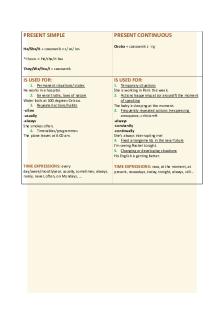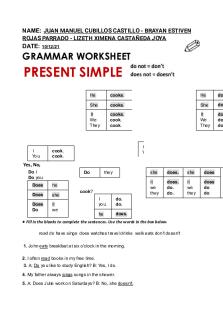Simple Present Time expressions PDF

| Title | Simple Present Time expressions |
|---|---|
| Course | Inglés Básico |
| Institution | Universidad Argentina John F. Kennedy |
| Pages | 4 |
| File Size | 342.9 KB |
| File Type | |
| Total Downloads | 22 |
| Total Views | 222 |
Summary
modulo 1 - ...
Description
Present simple Affirmative sentences Let’s take a look at these examples: •
Every morning, many Argentineans have “mate”.
Cada mañana, muchos argentinos toman mate. (Drinking mate is a routine)
•
In Chile, people drink “Cola de Mono” in the Holidays Season.
En Chile, la gente bebe “Cola de Mono” durante las Fiestas. (Periodically, Chileans have this alcoholic beverage)
•
Americans love coffee.
Los norteamericanos adoran el café. (This is characteristic of them)
Let’s pay attention to the verbs in the previous sentences: Have, drink, love. They are in the Present Simple tense. We use this tense to speak about activities or states that are always (or periodically) true. So, you need to use this tense for things you do with a certain frequency, to speak about scientific data or facts, or to describe states. For example, if you go to the gym one day a week, you say: •
“I go to the gym every Tuesday”. (Voy al gimnasio cada martes.)
• “Englishmen talk in English”, or “Lions eat meat” (Los ingleses hablan inglés / Los leones comen carne) are examples of data that is always true. •
“I know how to drive”, and “I understand how you feel”
(Sé manejar / Entiendo cómo te sientes) are states.
For the third person singular, we add an “S” to the verb: •
“She goes to the gym every Tuesday”. (Ella va al gimnasio cada martes.)
•
“He talks in English”, or “The lion eats meat” (Él habla inglés / El león come carne)
•
“Peter knows how to drive” (Pedro sabe manejar)
Person
Verb
Example
I
work
I work from home. Trabajo en mi hogar.
study
I study online. Estudio en línea.
works
He works at the office. Él trabaja en la oficina.
studies
She studies at college. Ella estudia en la universidad.
work
We work hard. Trabajamos duro.
study
You study a lot. Estudian mucho.
HE – SHE – IT
YOU – THEY – WE
Negative sentences Read the following passage: Minnesota is very cold in winter, so people don’t walk in the streets very often, they stay home. Usually, Minnesotans wake up early and have a coffee; they don’t drink mate at all. My cousin lives there; she doesn’t stay up late because the sun sets around 4.00 PM. The passage is about habits and routines, so it is in the Present Simple tense. But look at the verbs (don’t walk, don’t drink, doesn’t stay): they speak about what people do not do as a habit. Let’s take a look at the negative form: It is made up with the auxiliary verbs “do”, or “does”, the word “not”, and the base form of the main verb. DO + NOT + WALK or DOES + NOT + WALK
Pronouns Affirmative I YOU WE THEY HE SHE IT
WALK DRINK STAY WALKS DRINKS (*) STAYS
Negative DO NOT
DOES NOT
Contraction
WALK DRINK STAY
DON´T
WALK DRINK STAY
WALK DRINK DOESN´T STAY
(*) Remember? The third person (singular) ends with an “ S”.
WALK DRINK STAY
Example I don’t walk at night. (No camino de noche.)
He doesn’t drink mate. (Él no toma mate.)
Interrogative sentences What about questions in the Present Simple tense? How do we ask about habits and routines? There are two (2) types of questions, and two (2) types of answers: WH questions
1) What do you do? I am a translator.
The answer offers information
Question word (Q)
Auxiliary verb (A)
Subject (S)
Verb (V)
Example
What
do
you
do?
Where
do
you
work?
How
does
she
travel to the office?
When
do
they
study?
Who
do
you
study with?
I am a translator. ¿A qué te dedicas? Soy traductora. I work at home. ¿Dónde trabajas? Trabajo en casa. She sometimes takes the bus. ¿Cómo viaja a la oficina? A veces toma el colectivo. They study on Monday evenings. ¿Cuándo estudian? Estudian los lunes por la noche. I like to study alone. ¿Con quién estudias? Me gusta estudiar solo.
Yes/No questions
Do you study Tourism? No, I do not. / Yes, I do.
The answer is Yes or No
Auxiliary Subject verb (A) (S)
Verb (V)
Affirmative answer
Negative answer
Do
I
teach?
Yes, I do.
Does
it
rain here?
Yes, it does.
Does
he/she
Do
you
read the newspaper? study?
Yes, he does. Yes, she does. Yes, you do.
Do
we
Yes, we do.
Do
your friends
have lunch at 12? like traveling?
No, I do not. No, I don’t. No, it does not. No, it doesn’t. No, she does not No, she doesn’t. No, you do not. No, you don’t. No, we do not. No, we don’t. No, they do not. No, they don’t.
Yes, they do.
Time expressions Let’s take a look at these examples: I get up
at 7:00
in the morning
on weekdays.
Me levanto a las 7 de la mañana los días de semana.
I go to bed
around ten
in the evening
on weeknights.
Me voy a la cama a eso de las diez de la noche en la semana.
I leave work
early
in the afternoon
on weekends.
Me voy del trabajo temprano en la tarde los fines de semana.
I go home
late
at night
on Fridays.
Me voy a casa tarde a la noche los viernes.
I stay up
until midnight
on Saturdays.
Me quedo despierto hasta tarde los sábados.
I wake up
before / after noon
on Sundays
Me levanto antes/después del mediodía los domingos.
(*) Note that days of the week are always capitalized. (Los días de la semana siempre se escriben en mayúsculas)...
Similar Free PDFs

Simple Present Time expressions
- 4 Pages

Present simple and continuous
- 3 Pages
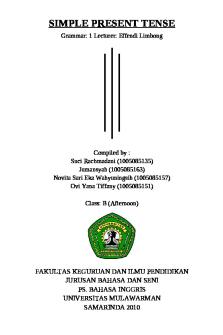
SIMPLE PRESENT TENSE
- 14 Pages
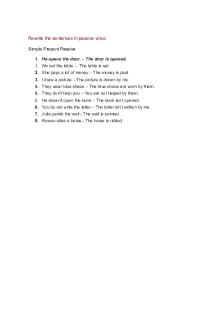
Present Simple Passive CC
- 1 Pages
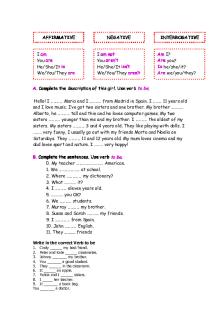
Present simple francisco
- 4 Pages
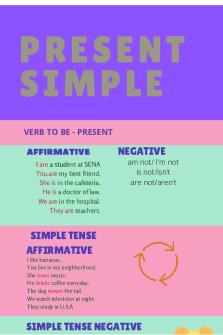
Present simple explanation
- 1 Pages

MAKALAH SIMPLE PRESENT TENSE
- 13 Pages
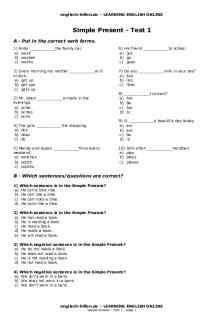
SIMPLE PRESENT ENGLISH 1
- 3 Pages

Conversation - PResent simple
- 1 Pages

S15T2 Simple Present Tense
- 1 Pages

Present simple - exercises
- 2 Pages
Popular Institutions
- Tinajero National High School - Annex
- Politeknik Caltex Riau
- Yokohama City University
- SGT University
- University of Al-Qadisiyah
- Divine Word College of Vigan
- Techniek College Rotterdam
- Universidade de Santiago
- Universiti Teknologi MARA Cawangan Johor Kampus Pasir Gudang
- Poltekkes Kemenkes Yogyakarta
- Baguio City National High School
- Colegio san marcos
- preparatoria uno
- Centro de Bachillerato Tecnológico Industrial y de Servicios No. 107
- Dalian Maritime University
- Quang Trung Secondary School
- Colegio Tecnológico en Informática
- Corporación Regional de Educación Superior
- Grupo CEDVA
- Dar Al Uloom University
- Centro de Estudios Preuniversitarios de la Universidad Nacional de Ingeniería
- 上智大学
- Aakash International School, Nuna Majara
- San Felipe Neri Catholic School
- Kang Chiao International School - New Taipei City
- Misamis Occidental National High School
- Institución Educativa Escuela Normal Juan Ladrilleros
- Kolehiyo ng Pantukan
- Batanes State College
- Instituto Continental
- Sekolah Menengah Kejuruan Kesehatan Kaltara (Tarakan)
- Colegio de La Inmaculada Concepcion - Cebu
